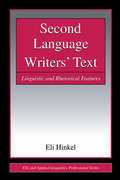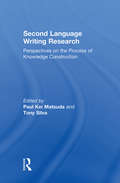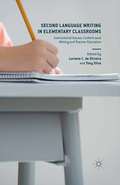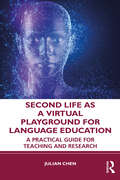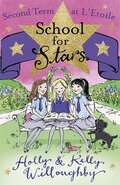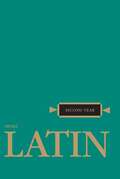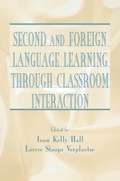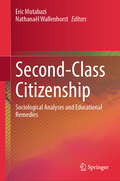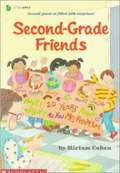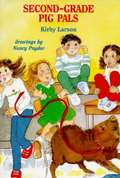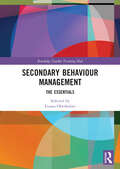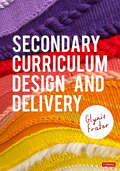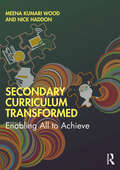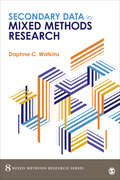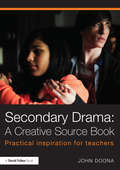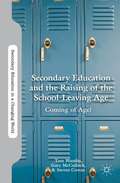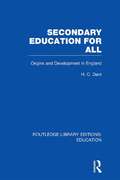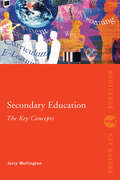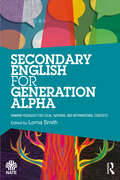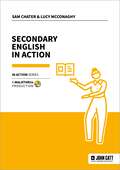- Table View
- List View
Second Language Writers' Text: Linguistic and Rhetorical Features (ESL & Applied Linguistics Professional Series)
by Eli HinkelThis comprehensive and detailed analysis of second language writers' text identifies explicitly and quantifiably where their text differs from that of native speakers of English. The book is based on the results of a large-scale study of university-level native-speaker and non-native-speaker essays written in response to six prompts. Specifically, the research investigates the frequencies of uses of 68 linguistic (syntactic and lexical) and rhetorical features in essays written by advanced non-native speakers compared with those in the essays of native speakers enrolled in first-year composition courses. The selection of features for inclusion in this analysis is based on their textual functions and meanings, as identified in earlier research on English language grammar and lexis. Such analysis is valuable because it can inform the teaching of grammar and lexis, as well as discourse, and serve as a basis for second language curriculum and course design; and provide valuable insight for second language pedagogical applications of the study's findings.
Second Language Writing Research: Perspectives on the Process of Knowledge Construction
by Paul Kei Matsuda Tony SilvaIn this original volume, eighteen researchers from different parts of the world reflect on their own research projects, providing insights into key methodological issues in research on second language writing. By offering a glimpse into the process of constructing and negotiating knowledge in the field--the messy space of situated practices of inquiry--it helps to demystify the research process, which can appear in published studies and in introductory methodology guides to be neater and more orderly than it actually is.Taking a broad conception of research as inquiry that emphasizes the situated and constructed nature of knowledge in the field, Second Language Writing Research: Perspectives on the Process of Knowledge Construction encourages multiple forms of inquiry, including philosophical, narrative, and historical modes. Empirical inquiry as presented in this book encompasses both quantitative and qualitative approaches as well as those that strategically combine them. A helpful discussion of the "nuts and bolts" of developing sustainable research programs is also provided. The volume as a whole facilitates a situated, issue-driven research practice. Its unique focus on second language writing research makes it an invaluable resource for both novice and experienced researchers in the field.
Second Language Writing in Elementary Classrooms: Instructional Issues, Content-area Writing and Teacher Education
by Luciana C. de Oliveira Tony SilvaSecond Language Writing in Elementary Classrooms.
Second Language Writing in Elementary Classrooms: Instructional Issues, Content-area Writing and Teacher Education
by Luciana C. de OliveiraSecond Language Writing in Elementary Classrooms focuses on L2 writing in elementary classrooms. It features chapters that highlight research in elementary classrooms focused on the writing development of multilingual children, and research in teacher education to prepare elementary teachers to teach L2 writing and address L2 writers' needs.
Second Life as a Virtual Playground for Language Education: A Practical Guide for Teaching and Research
by Julian ChenThis insightful book offers language teachers and teachers in training the opportunity to delve into 3D virtual worlds and see the benefits they provide for effective language teaching. Based on a decade of experience teaching and researching in Second Life (SL), Chen demystifies the dos and don’ts of SL teaching and research, whilst vividly walking readers through each step of the journey. Written in an accessible, jargon-free, and personalised tone, the book is divided into three parts. Part I builds the foundation in SL research, task-based language teaching (TBLT), and understanding fundamental skills for SL teaching. Part II showcases the author’s SL teaching blog that generously unveils their task-based, SL-enabled lessons, participant observations, critical reflections, and lessons learned from each SL session. Part III is complete with the highlights of the author’s SL research and hands-on resources and tips for readers. Each chapter also features a "Checkpoint" section to gauge reader understanding of chapter content, followed by a "Your Task" section to promote learning by doing in SL. Teachers and curriculum designers will find the well-detailed and guided lesson planning useful when starting their first SL class. Graduate students and novice researchers will also find the systematically recorded data collection helpful for their SL research.
Second Term at L'Etoile: Book 2 (School for Stars #2)
by Kelly Willoughby Holly WilloughbyThe second novel from the bestselling SCHOOL FOR STARS series written by celebrity sisters Holly and Kelly Willoughby. Catch up with Molly, Maria and Pippa as they return for their second term at the all-singing, all-dancing L'Etoile school.Christmas break is over and the three friends are reunited as they begin their second term at L'Etoile, the exclusive School for Stars. Little do they know what fun and surprises lay in store for them. A midnight mystery, a precious lost rose, centenary celebrations, a playful puppy with a twinkle in its eyes, and a royal visit are just some of the things that make them friends for ever.This book is GLEE for 9+ and is perfect for fans of BALLET SHOES and MALLORY TOWERS.
Second Year Latin
by Robert J. HenleThe backbone of Henle Latin Second Year is intensive language study, including review of the first year plus new materials. Separated into four parts, Henle Latin Second Year includes readings from Caesar's Commentaries, extensive exercises, and Latin-English vocabularies. Humanistic insight and linguistic training are the goals of the Henle Latin Series from Loyola Press, an integrated four-year Latin course. Time-tested and teacher endorsed, this comprehensive program is designed to lead the student systematcially through the fundamentals of the language itself and on to an appreciation of selected classic texts.
Second and Foreign Language Learning Through Classroom Interaction
by Joan Kelly Hall Lorrie Stoops VerplaetseThis volume brings together the current theoretical interest in reconceptualizing second and foreign language learning from a sociocultural perspective on language and learning, with practical concerns about second and foreign language pedagogy. It presents a set of studies whose focus is on the empirical description of particular practices constructed in classroom interaction that promote the learning of a second or foreign language. The authors examine in detail the processes by which the learning of additional languages is accomplished in the interaction of a variety of classrooms and in a variety of languages. Not only will the findings from the studies reported in this volume help to lay a foundation for the development of a more expansive, sociocultural model of second and foreign language learning, but on a more practical level they will help language educators in creating a set of principles for identifying and sustaining classroom interactional practices that foster additional language development. The volume is distinguished in three ways: * Following a Vygotskyan perspective on development, the studies assume that language learning is a fundamentally pragmatic enterprise, intrinsically linked to language use. This breaks from a more traditional understanding of second and foreign language learning, which has viewed learning and use as two distinct phenomena. The importance of classroom interaction to additional language development is foregrounded. * The investigations reported in this book are distinguished by their methodological approach. Because language learning is assumed to be a situated, context-sensitive, and dynamic process, the studies do not rely on traditional experimental methods for collecting and analyzing data, but rather, they involve primarily the use of ethnographic and discourse analytic methods. * The studies focus on interactional practices that promote second and foreign language learning. Although a great deal of research has examined first language learning in classrooms from a sociocultural perspective, little has looked at second and foreign language classrooms from such a perspective. Thus there is a strong need for this volume of studies addressing this area of research. Researchers, teacher educators, and graduate students across the fields of second and foreign language learning, applied linguistics, and language education will find this book informative and relevant. Because of the programmatic implications arising from the studies, it will also appeal to teacher educators and teachers of second and foreign languages from the elementary to the university levels.
Second-Class Citizenship: Sociological Analyses and Educational Remedies
by Nathanaël Wallenhorst Eric MutabaziA number of features of the contemporary period are preventing people from exercising their citizenship: the acceleration and permanent change in the conditions shaping habitability of planet Earth, the digital and techno-scientific revolution, the rise of religious and political radicalisation, the explosion of social inequalities, the hegemony of the economic drive to maximise individual interests, etc. For many individuals, citizenship appears to be prevented at the first hurdle. What is more, though officially or legally, it is not possible to speak of second-class citizenship-- so what can be done when the actors themselves use such terminology? There is something essential here which must be taken into account as a basis for thinking about the social, its inequalities and its injustices. The authors of this book propose the notion of 'second-class citizenship' as a way of thinking about the scale of contemporary social and political inequalities. In view of this observation, the contributors outline a movement based on the conviction that education is the repository of the power to prepare for the future. How can we learn to build a shared world together and overcome the obstacles that prevent us from doing so? How can we learn new habits of relationships marked by responsibility and hospitality? The collective reflection in this book lends credence to the way in which players talk about their experience, even experiencing differences in their ability to participate in the mechanisms of power. This book presents empirical studies and conceptual tools for thinking about the impact of economic factors on the ways in which citizens participate in the decisions of power. This book is particularly suited for educators as well as policy-makers and researchers.
Second-Grade Friends
by Miriam CohenJacob worries a lot. If only he knew how much his friends from second grade really like him... He thinks they think he's too short, too uninteresting, and just too strange because he likes beavers and has never gone on a fishing trip. He worries that no one will show up for his birthday party. When his entire class shows up to celebrate with Jacob, he finally understands just how wonderful and unique they really think he is.
Second-grade Pig Pals
by Kirby LarsonQuinn and her second-grade classmates are getting ready to celebrate National Pig Day. But Quinn is the only one who has not brought something piggy for the class's Pig Patch. She is more interested in making friends with her new classmate, Manuela. But then their friendship hits a snag. How can they make second-grade "pig perfect"? Reading level 2.2, Ages 7-10
Second-grade Star
by Nancy Alberts[from the back cover] "No more boring old Kelly? Kelly has been waiting for the Spring Concert for weeks. This year it's going to be really special--some of the second graders will have a chance to be stars! That's when Kelly decides that, more than anything, she wants to be selected for a special part. But, no matter how hard she tries to impress her teacher, she isn't chosen. Now what? Well, Kelly soon realizes that sometimes being a star isn't all it's cracked up to be. And that she has her own way of shining just as brightly."
Secondary Behaviour Management: The Essentials
by Lizana OberholzerThis concise book supplements the Routledge School Based Teacher Training Hub which you can find at www.routledgeteachertraining.comThe Hub has been developed in conjunction with teacher training experts and offers busy trainees and their mentors focussed, accessible, evidence-informed guidance that will help develop skills and confidence for successful classroom practice.The chapters in this collection on the Hub explore one of the most challenging aspects of learning to teach in the secondary school: Managing behaviour. The Hub provides:-Online access to ten chapters, carefully selected from across the breadth of Routledge's publishing, written by experts in the field, to cover core skills and knowledge for effective behaviour management.-An introduction to each chapter, designed to show how the evidence applies to your setting and practice, and how you can build on the advice to develop and improve teaching.-A self-audit test, to help you pinpoint gaps and understand where you will most benefit from skills and confidence development. -Observation sheets, offering a framework that will help you focus and reflect when you’re observing colleagues.-Short mentor meeting guides to structure initial and ongoing meetings with your mentor, to help you get the most out of these important relationships.
Secondary Curriculum Design and Delivery
by Glynis FraterThis is a practical guide for school leaders and teachers who have responsibility for designing and delivering a knowledge-rich and skills-focused curriculum at KS3 and KS4. It considers the elements that underpin a high-quality curriculum and how to create sequential and conceptually rich learning experiences for pupils across the secondary phase. Key topics include: Tools and techniques that can support staff to develop a cohesive curriculum across every secondary subject area A focus on essential knowledge and skills within each subject Transition from primary to secondary school and the importance of KS3 The role of leadership in defining curriculum vision, rationale and ambition A review of compulsory and desirable elements of curriculum planning such as well-being and physical health Glynis Frater is the founder and a director of Learning Cultures. She has taught across both the primary and secondary phases of education and delivers CPD programmes on leadership, curriculum planning and embedding coaching into a whole school culture.
Secondary Curriculum Design and Delivery
by Glynis FraterThis is a practical guide for school leaders and teachers who have responsibility for designing and delivering a knowledge-rich and skills-focused curriculum at KS3 and KS4. It considers the elements that underpin a high-quality curriculum and how to create sequential and conceptually rich learning experiences for pupils across the secondary phase. Key topics include: Tools and techniques that can support staff to develop a cohesive curriculum across every secondary subject area A focus on essential knowledge and skills within each subject Transition from primary to secondary school and the importance of KS3 The role of leadership in defining curriculum vision, rationale and ambition A review of compulsory and desirable elements of curriculum planning such as well-being and physical health Glynis Frater is the founder and a director of Learning Cultures. She has taught across both the primary and secondary phases of education and delivers CPD programmes on leadership, curriculum planning and embedding coaching into a whole school culture.
Secondary Curriculum Transformed: Enabling All to Achieve
by Meena Kumari Wood Nick HaddonMore than ever, secondary curriculum requires greater flexibility and adaptability so young people learn the relevant knowledge and key skills they need for the evolving world of training and employment. This practical guide, both radical and progressive, makes a compelling argument for a secondary curriculum that addresses the needs and aspirations of all students. A balanced approach will help reform students’ attitudes and behaviours and re-ignite their curiosity and motivation for learning. Secondary Curriculum Transformed proposes an ambitious GCSE five-year journey inclusive of academic, creative and technical subjects, including T-Levels and mandatory key skills. To equip young people with this critical knowledge and key skills, the book: transforms the 11–19 curriculum so it does not disadvantage, marginalise or exclude young people; showcases excellent practice case studies from British and international contexts; provides curriculum models which schools can adapt to their own context; signposts educational research and listens to the ‘student voice’; transforming them into leaders of their learning. Offering a comprehensive model for leaders and teachers to put the evidence into practice, this is essential reading for all education professionals. There are also additional templates, PowerPoints, useful links and other resources which can be downloaded from www.routledge.com/9780367900878. Offering a comprehensive model for leaders and teachers to put the evidence into practice, this is essential reading for all education professionals.
Secondary Data in Mixed Methods Research (Mixed Methods Research Series)
by Daphne C. WatkinsSecondary Data in Mixed Methods Research by Daphne C. Watkins, the latest contribution to the Mixed Methods Research Series, offers unique and necessary instruction in this growing topic. With the increasing amount of secondary data available through journals and repositories, researchers have a trove of sources for new investigations at their fingertips, but few books to guide them. This brief text provides readers with a step-by-step procedure for incorporating secondary data into various mixed methods research designs, as well as identifying key characteristics of existing datasets that make them good candidates for mixed methods projects and giving ideas for new uses of secondary data. Introductory chapters help the reader understand the “what” and “why” of secondary data. Subsequent chapters address the use of secondary data in convergent, exploratory sequential, explanatory sequential, and other complex research designs. The final chapters delve into writing and reporting on projects before, during, and after the project. Quotes throughout the chapter help readers remember key bits of knowledge, while learning objectives and summaries in each chapter structure the reading experience. Application questions at the end of each chapter help readers recall information and apply it to their own research projects. By emphasizing how to use existing qualitative and quantitative datasets in mixed methods research, Secondary Data in Mixed Methods Research will help readers answer new and ongoing questions in social science research.
Secondary Data in Mixed Methods Research (Mixed Methods Research Series)
by Daphne C. WatkinsSecondary Data in Mixed Methods Research by Daphne C. Watkins, the latest contribution to the Mixed Methods Research Series, offers unique and necessary instruction in this growing topic. With the increasing amount of secondary data available through journals and repositories, researchers have a trove of sources for new investigations at their fingertips, but few books to guide them. This brief text provides readers with a step-by-step procedure for incorporating secondary data into various mixed methods research designs, as well as identifying key characteristics of existing datasets that make them good candidates for mixed methods projects and giving ideas for new uses of secondary data. Introductory chapters help the reader understand the “what” and “why” of secondary data. Subsequent chapters address the use of secondary data in convergent, exploratory sequential, explanatory sequential, and other complex research designs. The final chapters delve into writing and reporting on projects before, during, and after the project. Quotes throughout the chapter help readers remember key bits of knowledge, while learning objectives and summaries in each chapter structure the reading experience. Application questions at the end of each chapter help readers recall information and apply it to their own research projects. By emphasizing how to use existing qualitative and quantitative datasets in mixed methods research, Secondary Data in Mixed Methods Research will help readers answer new and ongoing questions in social science research.
Secondary Drama: Practical inspiration for teachers
by John DoonaJohn Doona is an artist and a teacher of exceptional quality. He brings both artistic and human integrity to a wide range of drama work from the classroom to performance of the highest standards. His significant practice is firmly rooted in principle and knowledge of drama and children and young people. I recommend him to you as an exceptional and effective teacher and practitioner. Professor Jonothan Neelands, University of Warwick, UK What is a compelling scheme of work and how do I create one? What are the building blocks of Drama? How do I sustain interest and engagement? What is the purpose and impact of my daily work? Providing inspiration for daily practice alongside a full range of tried and tested schemes of work, this exciting new book offers support to secondary teachers wanting to create original drama experiences to meet their own unique classroom needs. The book models a positive and reflective approach to classroom practice offering a thoughtful exploration of the craft and art of drama teaching covering key issues such as classroom management, student engagement, planning, progression and assessment. After considering the theory behind drama in education and the fundamentals of practice, the majority of the text is devoted to the annotated schemes of work. These cover a diverse range of topics such as homelessness, addiction, terrorism and civil rights and show how the ideas discussed can be put into practice. Featuring a Preface by Dorothy Heathcote and a Foreword by Edward Bond, this resource will be valuable reading for both new and established teachers looking to deliver excellent inspiring drama lessons across the secondary setting and become a vibrant and effective drama specialist.
Secondary Education And The Raising Of The School-leaving Age
by Gary Mcculloch Tom Woodin Steven CowanThe progressive raising of the school-leaving age has had momentous repercussions for our understanding of childhood and youth, for secondary education, and for social and educational inequality. This book assesses secondary education and the raising of the school-leaving age in the UK and places issues and debates in an international context.
Secondary Education for All: Origins and Development in England (Routledge Library Editions: Education)
by H C DentThe Education Act of 1944 launched an unprecedented experiment in the history of education in the UK. This book is a brief survey of the routes by which compulsory free secondary education was arrived at, as well as an examination of the position in 1949 and suggestions for the future.
Secondary Education: The Key Concepts (Routledge Key Guides)
by Jerry WellingtonA comprehensive critical survey of the controversies, theories and practices central to secondary education today, this book provides teachers, researchers, parents and policy-makers with a vital new reference resource. It covers important topics including: assessment citizenship curriculum e-learning exclusion theories of learning work experience. Fully cross-referenced, with extensive suggestions for further reading and on-line resources, this is an essential guide to theory and practice in the twenty-first century classroom.
Secondary English for Generation Alpha: Humane Pedagogy for Local, National and International Contexts (National Association for the Teaching of English (NATE))
by Lorna SmithSecondary English for Generation Alpha seeks to promote a humane, responsive and creative pedagogy for English that will develop and enrich understanding and enjoyment of language in all its forms (speaking, listening, reading and writing) and help students develop into successful members of their home and wider communities.Generation Alpha (children born between 2010 and 2025) are growing up amid unprecedented challenges – local, national and global – that threaten social justice. The authors of this book see subject English as one means of supporting Generation Alpha to meet these challenges and provide them with the necessary skills and knowledge to fit them for a changing world. Responding to tendencies to standardise and centralise curriculum, pedagogy and teacher education, the book explores the ways in which subject English can draw on local contexts and expertise in schools, universities and communities to address local needs and interests, demonstrating how what we learn locally can be relevant beyond.The chapters in this volume represent work being done, individually and collectively, in settings across England, by teacher educators in universities and other centres, alongside their partnership schools. By describing their own practice in English classrooms, the authors hope to empower others – in England, but also beyond – simultaneously producing both a broad and an in-depth exploration of the subject. Secondary English for Generation Alpha emerges from the world of initial teacher education, yet takes ideas from current research and makes them relevant to teachers and those interested in English teaching in schools in any context.
Secondary English in Action
by Sam Chater Lucy McConaghyWith more than 20 years teaching experience between them, the authors of Secondary English in Action share clear examples of a range of strategies for teachers of secondary English, summarising research and thinking on approaches within English teaching while maintaining a focus on application in the classroom to inspire enthusiasm and love for English.Not bounded by the constraints of current examination frameworks but a vision of what experiencing English should be for a student, this book covers teaching students how to use oracy appropriately, how to interpret texts fully and how to create their own texts accurately and with purpose.McConaghy and Chater make the case for the importance and value of English, along with a range of ways to promote engagement and uptake and so, whether you are beginning your journey into teacher training, working as a teaching assistant or are an experienced teacher looking for new inspiration and ideas, this is an essential guide for all English classroom-based staff.
Secondary English in Action
by Sam Chater Lucy McConaghyWith more than 20 years teaching experience between them, the authors of Secondary English in Action share clear examples of a range of strategies for teachers of secondary English, summarising research and thinking on approaches within English teaching while maintaining a focus on application in the classroom to inspire enthusiasm and love for English.Not bounded by the constraints of current examination frameworks but a vision of what experiencing English should be for a student, this book covers teaching students how to use oracy appropriately, how to interpret texts fully and how to create their own texts accurately and with purpose.McConaghy and Chater make the case for the importance and value of English, along with a range of ways to promote engagement and uptake and so, whether you are beginning your journey into teacher training, working as a teaching assistant or are an experienced teacher looking for new inspiration and ideas, this is an essential guide for all English classroom-based staff.
